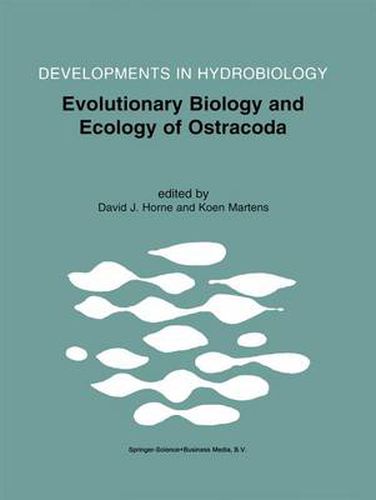Readings Newsletter
Become a Readings Member to make your shopping experience even easier.
Sign in or sign up for free!
You’re not far away from qualifying for FREE standard shipping within Australia
You’ve qualified for FREE standard shipping within Australia
The cart is loading…






This title is printed to order. This book may have been self-published. If so, we cannot guarantee the quality of the content. In the main most books will have gone through the editing process however some may not. We therefore suggest that you be aware of this before ordering this book. If in doubt check either the author or publisher’s details as we are unable to accept any returns unless they are faulty. Please contact us if you have any questions.
Ostracoda (crustacea) are potentially excellent model organisms for evolutionary studies, because they combine an extensive fossil record with a wide modern distribution and therefore allow studies on both patterns and processes leading to extant diversity. The main scientific domains contributing theories, concepts and data to evolutionary biology are morphology (including ontogeny), palaeontology, genetics and ecology, and to all of these aspects ostracods can contribute. This is illustrated by the 15 papers presented under Theme 3 of the 13th International Symposium on Ostracoda (Chatham, UK) in 1997 which are grouped in the proceedings, one of three volumes resulting from this meeting. The contributions deal with the evolution of both extant and fossil forms (including most of the Phanaerozoic), ecology of both marine and freshwater taxa, and (developmental) morphology of both soft parts and valves. Although the canvas is wide, each paper shows how studies on Ostracoda can be relevant to general theory on evolutionary biology and ecology.
$9.00 standard shipping within Australia
FREE standard shipping within Australia for orders over $100.00
Express & International shipping calculated at checkout
This title is printed to order. This book may have been self-published. If so, we cannot guarantee the quality of the content. In the main most books will have gone through the editing process however some may not. We therefore suggest that you be aware of this before ordering this book. If in doubt check either the author or publisher’s details as we are unable to accept any returns unless they are faulty. Please contact us if you have any questions.
Ostracoda (crustacea) are potentially excellent model organisms for evolutionary studies, because they combine an extensive fossil record with a wide modern distribution and therefore allow studies on both patterns and processes leading to extant diversity. The main scientific domains contributing theories, concepts and data to evolutionary biology are morphology (including ontogeny), palaeontology, genetics and ecology, and to all of these aspects ostracods can contribute. This is illustrated by the 15 papers presented under Theme 3 of the 13th International Symposium on Ostracoda (Chatham, UK) in 1997 which are grouped in the proceedings, one of three volumes resulting from this meeting. The contributions deal with the evolution of both extant and fossil forms (including most of the Phanaerozoic), ecology of both marine and freshwater taxa, and (developmental) morphology of both soft parts and valves. Although the canvas is wide, each paper shows how studies on Ostracoda can be relevant to general theory on evolutionary biology and ecology.